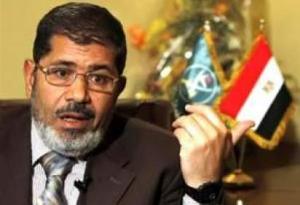Foreign affairsMorsi faces tough decisions
On Sunday, the Muslim Brotherhood’s candidate, Mohammed Morsi, was declared the winner in Egypt’s first free elections, defeating General (Ret.) Ahmed Shafiq, who served as Hosni Mubarak’s last prime minister; Morsi faces many issues and problems on the domestic front and about Egypt’s regional relations – among them: the role of the military in Egypt’s life, the degree of Islamization in Egypt, the deteriorating the security situation in the Sinai, and Egypt’s regional role

Mohammed Morsi, Egypt's new president // Source: yasatir.com
On Sunday, the Muslim Brotherhood’s candidate, Mohammed Morsi, was declared the winner in Egypt’s first free elections, defeating General (Ret.) Ahmed Shafiq, who served as Hosni Mubarak’s last prime minister.
Morsi faces many issues and problems on the domestic front and about Egypt’s regional relations. Here are four issues the new president must deal with — two immediate ones, and two longer term decisions:
The role of the military
The Egyptian military has been the dominant force in Egypt political life since the Free Officers revolution of 1952. Mubarak was toppled a year and a half ago, but since then the Egyptian military proved itself willing and able to continue to assert its authority in Egypt.
- Only a week ago, when polls were closing in the runoff presidential election, the Supreme Council of the Armed Forces (SCAF) issued constitutional amendments which stripped the president’s office of most of its major powers.
- The ruling generals, in the words of the BBC, he declared themselves to be the final arbiters over the most pressing issues the transition process faces — writing the constitution, legislating, passing the state budget — and granted military police broad powers to detain civilians.
- The military was also exempted from civilian oversight.
- The SCAF then issued a decree dissolving parliament in line with a Supreme Constitutional Court ruling that the law on elections to the lower house was invalid because party members had been allowed to contest seats reserved for independents.
- Then on Monday, Field Marshal Tantawi announced the re-establishment of a National Defense Council, putting the generals in charge of Egypt’s national security policy.
The generals said they would hand over power to the new president by 30 June, but since they dissolved parliament and emptied the presidency of most of its powers, Morsi will be assuming office without the oversight of a sitting legislature, without a permanent constitution, and without a clear mechanism to define to roles and responsibilities of Egypt’s governing bodies.
The deteriorating situation in the Sinai
During the past eighteen months, the security situation in the Sinai Peninsula, the desert area separating Egypt from Israel. The vast area is largely empty, save for nomadic Bedouin clans. Since 2007, when Hamas took over the Gaza Strip, Iran has been using these Bedouin to smuggle arms into Gaza. Since the collapse of the Mubarak regime, Egypt’s control of the area has weakened even more, and Israeli and Egyptian intelligence sources now report that al Qaeda
